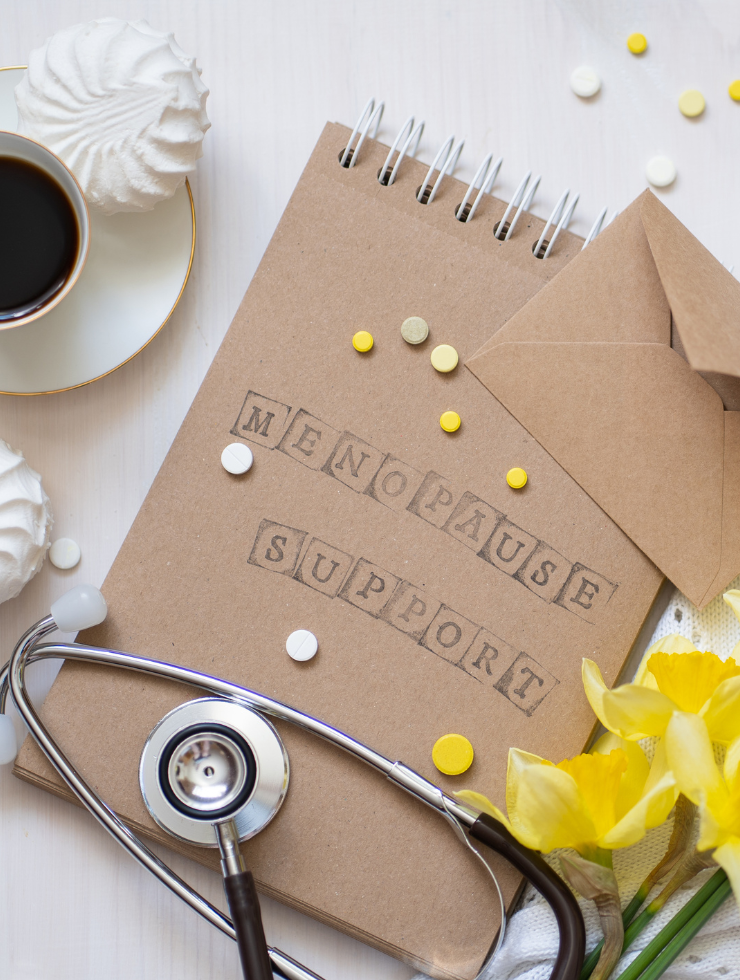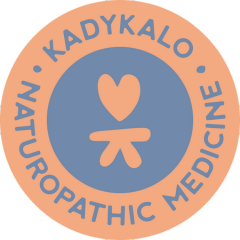Dr. Christine Kadykalo, ND • July 25, 2023
Naturopathic Menopause Support
What is Menopause?
Menopause is the permanent cessation of menstration following the loss of ovarian activity. For official diagnosis, you must have gone 12 consecutive months without menstrual bleeding. The average age of menopause is between 50-52 but can range anywhere from age 40-58.

The average age of menopause is between 50-52 but can range anywhere from age 40-58.
What Is Perimenopause?
Defined as the period immediately before menopause. It starts with changes in the menstrual cycle or hormones and ends 12 months after your final period (when menopause begins). The average age is 47. This phase will last about 4 years, but can last up to 10 years for some women.
Perimenopause is often where you experience symptoms, such as hot flashes and/or perhaps sleep issues. A 3:00 am waking time is common due to a spike in cortisol (more about this below) or a drop in blood sugar. Anxiety and depression can set in as progesterone declines. Periods will change, first becoming heavier and closer together, and then eventually further apart. You may even start to experience irritability, fatigue, and headaches.
Natural treatments and bio-identical hormones can be very effective to help mitigate symptoms and allow you to live and feel your best.
For some women, the transition can be very challenging, suddenly not feeling like themselves. Patients will often be dismissed and told to go home and "suck it up". They may be prescribed the birth control pill or an IUD, but these will often not address all of the systemic symptoms. In this case, medicine is not helping you to live your best life. Natural treatments and bio-identical hormones can be very effective to help mitigate symptoms and allow you to live and feel your best.
There was once a big fear around hormone therapy because of a large study put out by the Women's Health Initiative (WHI). A study which concluded that hormone replacement therapy caused increased risk of cancer and cardiovascular disease. However, the risks were prevalent because hormone therapy was initiated too late after menopause. We now know that when certain forms of hormones are initiated within 10 years of menopause and before age 60, they are safe for the right individual. Hormone prescriptions can have benefits depending on when they are prescribed and how. This treatment is meant to be individualized and can help ease the menopause transition when used appropriately. A more in-depth blog containing information pertaining to hormone therapy and menopause can be found at AlterEgo Health.

production of estrogen and progesterone begins to lessen.
What's Happening With Your Hormones?
In perimenopause, ovarian function starts to decline, meaning you are no longer producing a strong egg. With this change, production of estrogen and progesterone begins to lessen. Estrogen will fluctuate significantly during perimenopause before stabilizing to a new low level in post-menopause. The body starts to depend on adrenal function as the main source of hormones. For this reason, the health of your adrenal glands can help determine how easy or challenging perimenopause will be for you. The adrenal glands are where we produce our stress hormone, cortisol. So, if you have had a history of trauma and/or high day to day stresses, your adrenal gland function may be compromised.
To Test Or Not To Test?
Testing is not necessary, as symptoms tell us a lot. However, testing can be beneficial for a number of reasons.
Blood hormone testing:
- Blood testing can help determine whether you are in menopause or not.
Urinary and salivary hormone testing:
- Assesses hormone levels and metabolites (how your body is processing and eliminating hormones).
・Estrogen metabolism - This assesses whether you are eliminating estrogen properly and whether you tend to make more of the protective or non-protective form of estrogen.
・Cortisol levels - Cortisol levels can be affected by daily demands, physical and/or emotional trauma. There are different treatment options available depending on whether your cortisol is too high or too low and at what time of day.
Strategies to ease the menopause transition
・Adequate protein - Protein is needed to optimize muscle mass and bone structure. Protein helps to stabilize energy and blood sugar. It also supports dopamine and serotonin production.
・Exercise - Walking daily and weight lifting 2-3 times per week helps to build and maintain muscle mass which supports metabolism and weight loss. Weight training also helps to maintain bone health which is essential in preventing osteoporosis.
・B Vitamins - B Vitamins are essential in helping the body metabolize hormones properly.
・Cruciferous vegetables - Cruciferous vegetables (broccoli, cabbage, kale, etc.) also assist to metabolize hormones. These nutrients are also available in a supplement version if you have a hard time consuming enough of the vegetables.
・Glutathione - Glutathione is an antioxidant found in plants and animals. It is an important cellular energizer and is also good for ovarian health.
・Magnesium bis-glycinate - A dietary supplement that can encourage sleep quality and anxiety prevention.
・Herbal prescriptions and/or Bio-Identical hormone therapy - Individualized therapies can help balance hormones.
BOOK A COMPLIMENTARY CONSULTATION
Dr. Christine Kadykalo, ND • July 25, 2023
REFERENCES:
https://www.nia.nih.gov/health/what-menopause
(2) WHI Response to NYT article "Women have been misled about menopause"
https://www.whi.org/md/news/nyt-response
(3) NAMS - The North American Menopause Society
The information contained on this website is provided for informational purposes only and does not constitute medical advice, a diagnosis, or replace that of your healthcare practitioner. If you need medical assistance, please consult your healthcare provider.

